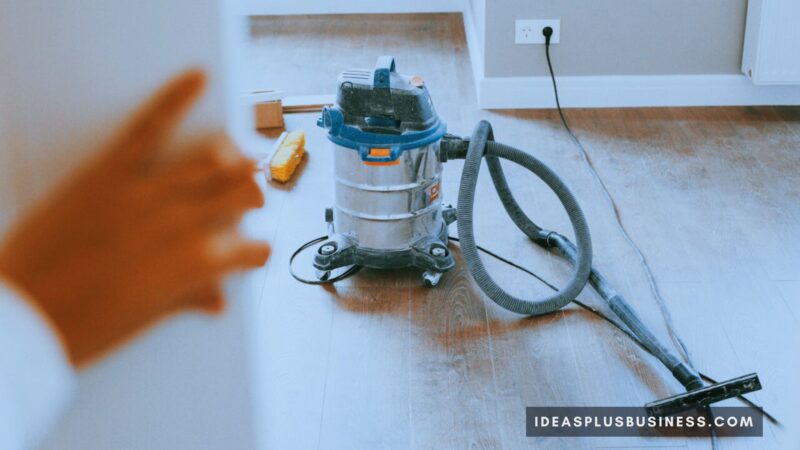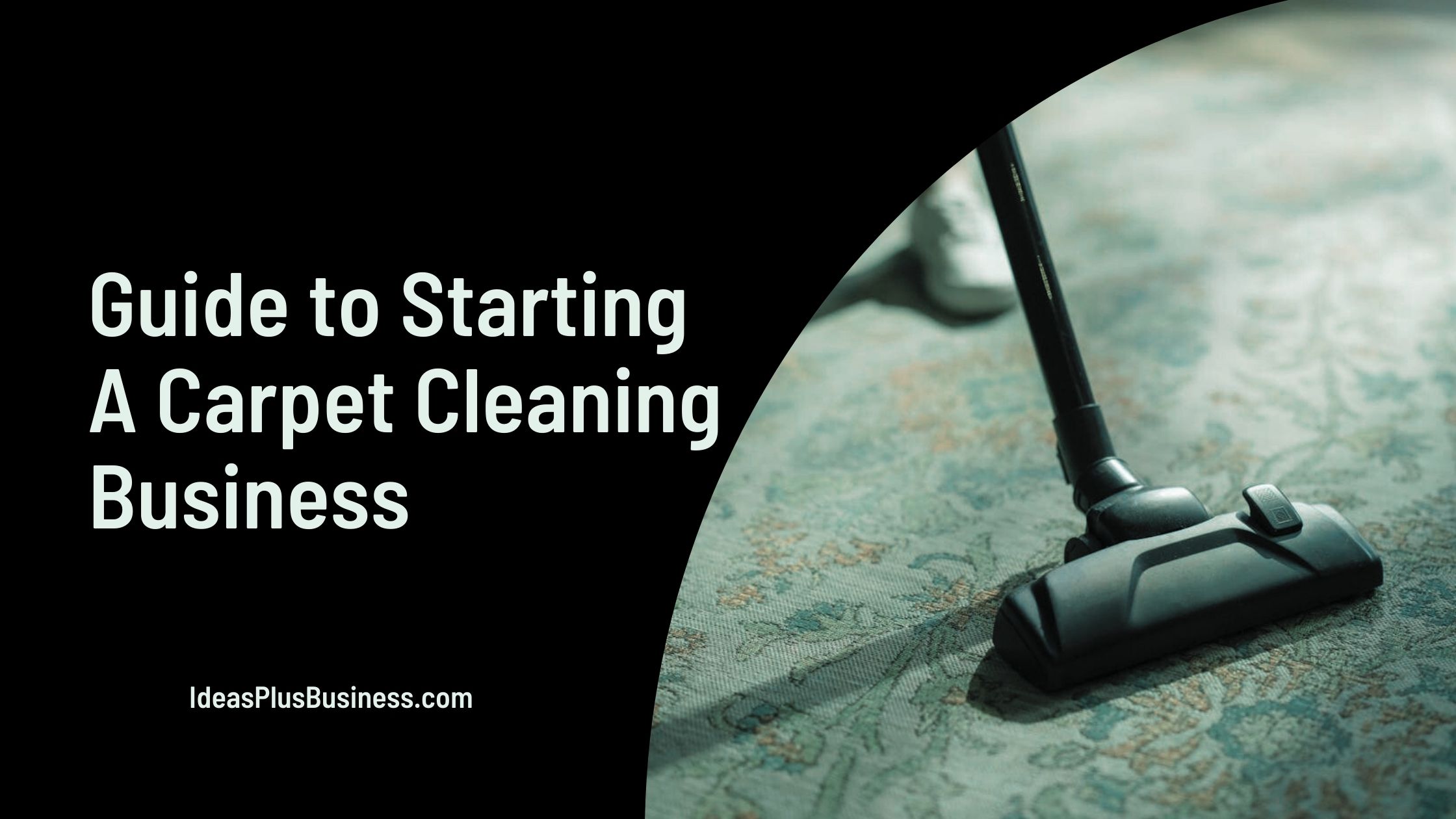Starting a carpet cleaning business entails more than just having the right equipment and skills. It is about laying a solid foundation that aligns with your vision and market demands.
Like any other business, a carpet cleaning business allows you to take control of your career, set your hours, and make a profit. When you secure solid residential and commercial client rosters, you can expect a consistent workflow, but your income will depend on the number of clients you serve, your rates, and the services you offer.
The average salary of a carpet cleaning business owner with a team of five is about $105,000.
Steps to Start A Carpet Cleaning Business
The carpet cleaning business can be a rewarding venture for those who enjoy providing a valuable service and working independently.
Here are detailed steps to help you navigate the process, from drafting a comprehensive business plan to navigating regulatory requirements and selecting the appropriate insurance coverage in detail.
1. Create a Business Plan
Your business plan is a roadmap that shows how your business will operate, its goals and objectives, and strategies to achieve them. You should include:
- Business Overview: The services you will provide, such as commercial carpet cleaning or residential carpet cleaning.
- Pricing strategy: Your rates for different carpet cleaning services.
- Service list: All services you offer, such as curtain cleaning, inspection cleaning, carpet and rug cleaning, etc.
- Competitive analysis: Are there other carpet cleaning businesses in the area you’ll serve?
- Employee planning: Your hiring plan to fill roles you need, such as cleaning technicians.
2. Certification and Training
Courses offered by the Institute of Inspection Cleaning and Restoration Certificate (IIRC) can get you specialized certifications, such as in commercial carpet maintenance or as a carpet cleaning technician.
For training, you can ask to shadow other carpet cleaning business owners and their crews or clean your family, neighbors, and friends, carpets at a discounted rate, or for free to help you get experience.
3. License and Register
Contact your county, town, or city clerk’s office to learn about permit requirements and local licensing for cleaning businesses. As part of your registration process, choose a business structure:
- Sole proprietorship: If you want to be the sole owner, you don’t need to register your business. However, this will mean your business isn’t recognized as a separate legal entity, and you will be personally liable for business debts.
- Partnership: This is a joint venture where the owners aren’t recognized as separate entities from the business.
- Limited Liability Company (LLC): This offers legal protection by preventing your assets from being seized to repay company debts.

4. Choose the Right Carpet Cleaning Equipment
Carpet cleaning business tips for the right equipment include using user-friendly tools and lightweight equipment with intuitive functioning and hand-held designs for effective carpet cleaning.
When choosing equipment, you should also opt for environmentally conscious, green cleaning solutions and consider energy usage, water consumption, and transportation requirements. You will need:
- Modern carpet cleaning machinery
- Carpet cleaning solutions
- Stain removers
- Defoamers
- Carpet rake
- Hoses
- Sprayers
- Wands
- Furniture sliders
- Commercial vacuums
- Corner guards
5. Obtain Insurance
Insurance will protect your carpet cleaning business in case of any accident, damage, or other problems. You can get:
- General liability insurance protects your business against property damage, bodily insurance, and personal injury claims.
- Business income insurance keeps your business active after a disaster or accident.
- Commercial property insurance protects and covers carpet cleaning and office equipment.
- Worker’s compensation insurance: Most states require these to protect employees.
- Commercial auto insurance covers financial losses incurred in vehicle accidents like carpet cleaning vans.
- Janitorial bonds: These are also called employee dishonesty bonds and are a surety bond that reimburses clients in case of employee theft.
6. Develop a Marketing Strategy
Developing a marketing strategy when starting a carpet cleaning business will help you grow fast. Follow these steps:
- Target Market: Identify your ideal customer base, whether residential or commercial properties.
- Marketing Channels: Explore online advertising, local listings, flyers, and partnerships with real estate agents or property managers.
- Build an Online Presence: Create a website showcasing your services, testimonials, and contact information. Consider social media marketing to reach potential customers.
7. Provide Excellent Customer Service
Excellent customer service is one of the keys to starting a successful carpet cleaning business.
- Set Clear Expectations: Communicate pricing, service inclusions and exclusions, and appointment scheduling procedures.
- Be Professional and Reliable: Arrive on time, maintain a professional demeanor, and offer exceptional service quality.
- Gather Feedback and Testimonials: Encourage satisfied customers to leave reviews and provide feedback to help improve your services and attract new clients.
8. Continuously Learn and Adapt
Always be ready to learn, unlearn, and relearn to adapt to the carpet cleaning business industry.
- Stay Updated on Industry Trends: Attend industry events, workshops, and online resources to stay informed about new cleaning methods and technologies.
- Network with other Businesses: Connect with other carpet cleaners or industry professionals to share knowledge, collaborate, and explore potential partnerships.
- Refine your Business Model: Analyze your progress, identify areas for improvement, and adapt your strategies based on market feedback and performance data.

How much does it cost to start a carpet cleaning business?
The cost of starting a carpet cleaning business can vary significantly depending on several factors, including:
1. Equipment
- Truck-mounted systems: This is the most common and powerful option, ideal for larger businesses. Expect costs of truck-mounted systems to range from $20,000 to $30,000 for a basic unit.
- Portable carpet cleaners: These are more affordable, starting around $200 and going up to $5,000 for professional models. They are suitable for smaller businesses or part-time ventures.
- Other equipment: You’ll also need carpet cleaning supplies like vacuums, hoses, cleaning solutions, stain removers, and protective gear. Budget around $500 to $1,000 for these equipment.
2. Business Registration and Licenses
Costs can vary depending on your location but generally expect to spend $75 to $400 for licenses and permits.
3. Insurance
Liability and property insurance are crucial. Costs depend on your coverage level and business size but expect to pay at least $360 per year.
4. Marketing and Advertising
Building your carpet cleaning business brand and attracting clients requires marketing efforts. Costs can vary widely, but consider budgeting $150 to start with a basic website and business cards.
5. Other Costs
- Vehicle: You’ll need a reliable vehicle to transport equipment and reach clients. Consider owning a van or truck, factoring in gas and maintenance costs.
- Uniforms: Branded uniforms for a carpet cleaning business create a professional image. Budget $50 to $150 for yourself and any employees.
Breakdown of costs of starting a carpet cleaning business
- Minimum startup (bare-bones): $1,810 – $3,860 (includes essential supplies, basic marketing, licenses, and low-cost used equipment).
- Moderate startup: $7,000 – $10,000 (includes portable HWE equipment, marketing materials, insurance, and a used vehicle).
- Well-equipped startup: $20,000 – $30,000+ (includes truck-mounted HWE equipment, comprehensive marketing strategy, vehicle, and insurance)
These are just estimates, and your actual costs may be higher or lower depending on your specific choices and location. It is crucial to research and plan your budget carefully before starting your carpet cleaning business.

How much does a carpet cleaning business make?
The money a carpet cleaning business makes can vary greatly depending on several factors, making it difficult to give a definitive answer. However, here is the general range of what you can expect as potential income:
- Starting a new carpet cleaning business: They can expect $32,000 – $50,000 per year (average).
- Established carpet cleaning businesses: They can expect $50,000 – $75,000 per year (average).
- Highly successful carpet cleaning businesses: Companies with a strong brand, efficient operations, and a large client base can potentially reach 7-figure annual revenue with a net income of hundreds of thousands. This requires significant effort and growth strategies.
How much is a carpet cleaning business worth?
Determining the exact worth of a carpet cleaning business is complex and requires professional evaluation.
An average carpet cleaning business might be valued in the $50,000 – $150,000 range, but the actual value can vary significantly depending on different factors. Consulting a professional appraiser or business broker for a more accurate valuation of your specific carpet cleaning business is crucial for making informed decisions in selling or buying.
Several methods can provide a general estimate of the worth of a carpet cleaning business. Some of these methods are:
1. Market Comps (Comparables Valuation)
This method compares the target business to similar carpet cleaning businesses that have recently been sold. By analyzing their selling prices and considering factors like location, size, revenue, and profitability, you can estimate the target business’s value within a similar range.
2. Discounted Cash Flow (DCF) Valuation
This method predicts the future cash flow the business is expected to generate and then discounts it back to its present value. This approach considers the business’s growth potential, profitability, and risk factors to arrive at a valuation.
3. Seller’s Discretionary Earnings (SDE) Multiple
This method multiplies the owner’s SDE, which reflects the business’s annual cash flow available to the owner, by a specific industry multiple (typically ranging from 2 to 4). The resulting value represents the estimated purchase price a potential buyer might pay.
It is important to note that these methods are not foolproof and should be used in conjunction with professional expertise. A business valuation specialist can consider various factors specific to the target business, such as:
- Financial performance: Revenue, profitability, growth trends, and debt levels.
- Market conditions: Competition, demand for services, and industry trends.
- Intangible assets: Brand reputation, customer base, and intellectual property.
- Management team: Experience, skills, and track record.
- Customer base: A large and loyal customer base with recurring business contributes significantly to the value.
- Location and market size: Businesses operating in areas with higher demand and demographics conducive to their services tend to be more valuable.
- Assets: The value of equipment, vehicles, and other tangible assets contributes to the overall worth.
Intangible assets: Brand reputation, customer loyalty, and established processes also play a role in determining value.

What do I need to start a carpet cleaning business?
Starting a carpet cleaning business requires planning, preparation, and several crucial steps to ensure a successful launch.
Create a professional brand identity. A logo, website, and consistent messaging establish trust and credibility. Develop a system for scheduling appointments and managing customer requests. Stay up-to-date on industry trends and best practices.
Conclusion
Starting a successful carpet cleaning business takes time, dedication, and continuous learning.
Certification from esteemed institutions and practical experience contribute to professional competence. Navigating local regulations, choosing the right business structure, and investing in modern, eco-friendly equipment are pivotal decisions.
By following these steps, diligently building your brand, and consistently delivering exceptional service, you can establish a thriving business in this growing industry.

I am Adeyemi Adetilewa, an SEO Specialist helping online businesses grow through content creation and proven SEO strategies. Proficient in WordPress CMS, Technical Site Audits, Search Engine Optimization, Keyword Research, and Technical Writing (Portfolio).
I help brands share unique and impactful stories through the use of public relations, advertising, and online marketing. My work has been featured in the Huffington Post, Thrive Global, Addicted2Success, Hackernoon, The Good Men Project, and other publications.

